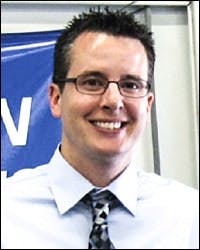How did the new focus come about?
The industry knows that we’re in a crisis mode where it’s a very aged industry. In some markets, the average repair technician’s age is 45 or 50 years old. The industry understands that they need to start supporting these schools now if we want to transition these students into the industry and help address that issue. The more we can support those schools and students becoming well trained and ready for employment, it only makes for better employer situations, where they hire someone who is ready to hit the ground running and be an efficient employee when they graduate.
Now, this is not just on the body shop side. We have insurance companies and paint companies and tool companies that are approaching us with the same issues that it’s an aged workforce. Most people in the industry start off working for a body shop and they might segment out into working for an insurance company or someone else. That’s the usual career path. That’s something we’re working on to showcase with students. You don’t just need to work on a car for the next 40 years of your life. There’s a lot of different areas you can get into that’s still part of the greater collision industry as a whole.
We know that there’s an issue nationwide of getting the students in the program, but it’s starting in the grade school level of making them aware of this industry, which would take a significant effort. I attend, exhibit and present at the national school counselor conference. School counselors gather for their annual conference, and I present on behalf of the industry on how to get them aware of the employment opportunities in our industries. We want to take that to the next level of saying, it’s a viable career, it’s not just a place to send the bad kids. It’s not a shift because we’re still collecting donations. It’s just adding on to what we’re doing to help introduce students to the industry.
What are some ways the Ed. Foundation is trying to get that message across?
What this industry should be very aware of and what they should address is that a lot of other technical trades are in the same position we are. Everyone is pushed to go to a four-year college. They’ve had this national push for quite some time. There’s a lot of other technical trades that are in demand for students. We have to make sure we’re putting on the best face possible as an opportunity for these students if we want the best of the best of these students.
I could say we’ve raised $100 million in support but if these students are not entering the industry, it’s not addressing the issue and, rightfully so, we would have donors asking where the return is on those donations. To address that issue, we have started organizing and facilitating career fairs around the country. The initial one was held in 2014 in Dallas with the Van Tuyl Group [now Berkshire Hathaway Automotive]. They closed down one of their 50,000-square-foot dealerships for a couple days and brought in local area collision students and industry contracts.
Now we’ve started doing that nationwide. These events are bringing in 100–200 students.
How will the Foundation help reach students who can’t attend career fairs?
To reach even more students, what we’re working on now is building a résumé database that we’d make available to our industry supporters at first. After a certain point, we would release it to the entire industry. It would allow students that can’t make it to these events still get introduced to industry employers.
It’s a combination of them uploading a résumé that they’ve already created or we have some standard questions that they could complete about their contact info, when they are graduating, if they’re a military veteran, what they’re interested in. It would create a résumé profile for them. When a business is interested, they’ll be given access to it and they can search through a listing of all these profiles.




